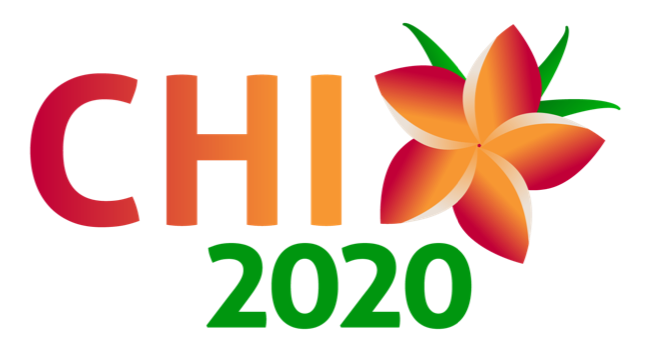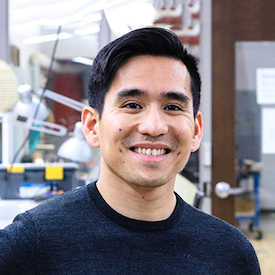Post-CHI 2020 Study Group
July 18 (Sat), 18:00-22:40 via Zoom

This year, the ACM CHI Conference on Human Factors in Computing Systems accepted 762 papers to be part of its main program. As a local post-conference event, we will be presenting short overviews of the papers to get a quick view of the latest works in HCI. This event was inspired by the annual CHI Study Group organized by the SIGCHI Japan Chapter.
Why join the study group?
HCI is a very diverse field and it is steadily growing in terms of the number of exceptional contributions and the emergence of new lines of research. For example in 2021, a growing number of contributions in critical computing and computational interaction led to the creation of new subcommittees in the conference. The study group aims to quickly get an overview of the new HCI research contributions published at the premier HCI conference. After this event, we hope that the participants can identify topics and problems that they are interested in and start new research projects.
We also invited Filipino researchers who have accepted papers at CHI 2020. We will have Gierad Laput from Apple as our Keynote speaker and Benedict Olgado from UC Irvine for an invited talk about his recent work.
In 2021, the CHI conference will be held in Japan for the first time. We hope that this event can inspire the Filipino HCI community to work on exceptional submissions.
Keynote

Gierad Laput, Apple
As computing proliferates into everyday life, systems that understand people’s context of use are of paramount importance. Regardless of whether the platform is a mobile device, a wearable, or embedded in the environment, context offers an implicit dimension that will become highly important if we are to power more human-centric experiences. Context-driven sensing will become a foundational element for many high-impact applications, from specific domains such as elder care, health monitoring, and empowering people with disabilities, to much broader areas such as health and novel interactive experiences. In this talk, I discuss the construction and evaluation of sensing technologies that can be practically deployed and yet still greatly enhance contextual awareness, primarily drawing upon machine learning to unlock a wide range of applications. I discuss algorithms and pipelines that extract meaningful signals and patterns from sensor data to enable high-level abstraction and interaction. I also discuss system and human-centric challenges, and I conclude with a vision of how rich contextual awareness can enable more powerful experiences across broader domains.
Invited

Benedict Olgado, UC Irvine
[Honorable Mention] Determining the Extractive Casting Mold of Intimate Platforms through Document TheoryThis paper introduces document theory as a mechanism to analyze intimate platforms as sociotechnical systems. The theory, developed in documentation studies and applied to HCI, focuses on the casting mold or how agents, through particular means and modes, produce documents that govern social relations. We studied the process of creating a profile by identifying and mapping out the fields asked among the ten most popular online dating apps in the US. By looking at dating profiles as documents and their creation as a process of documentation, we argue that the current casting mold of these intimate platforms is designed to extract profit via invisibilization of labor in digital networks leading to the emergence of a constrained rational market agent. Our study illustrates how document theory makes visible the assumptions of technological systems, calling on us to imagine alternatives beyond incremental design changes given broader structural realities of market and power.
Program
All times are in Philippine Standard Time (GMT+8)
- 18:00-18:10 >> Opening Remarks
- 18:10-19:40 >> Free selection sessions (17 sessions)
- 6 | Portrayals & social media by Joshua Manzano
- 11 | A closer look at players by Romeo Peña
- 29 | Perception of visualizations by Unisse Chua
- 32 | Political movement by Ian Ona
- 38 | Designing for health by Paolo Delos Reyes
- 53 | Gamifying & play by Geremiah Marasigan
- 96 | Tutoring & learning by TJ Monserrat
- 112 | AI/ML & seeing through the black box by Ralph Regalado
- 140 | Emotional interaction by Adrienne Soliven
- 154 | Human factors in design by Thomas Rafael Cruz
- 155 | Engineering design & modelling by Jordan Deja
- 107 | On-body interaction by Tyrone Sta. Maria
- 23 | Privacy theory & information disclosure by Pranjal Jain
- 106 | Privacy & security user experience by Pranjal Jain
- 118 | Privacy perceptions & concerns by Pranjal Jain
- 138 | Communities & social aspects of privacy by Pranjal Jain
- 19:40-20:00 >> Break Please grab some dinner.
- 20:00-20:30 >> Curated sessions (5 sessions)
- 56 | (mis)Information & fake news by Ralph Regalado
- 71 | Understanding & supporting mental health by Kyle Santiago
- 98 | Augmenting work & productivity by Briane Samson
- 117 | Inclusiveness & diversity by Jen Teves
- 149 | Inclusive research methods by Jen Teves
- 20:30-21:10 >> Filipino research @ CHI2020
- [LBW] Are Two Heads Better than One? Exploring Two-Party Conversations for Car Navigation Voice Guidance by Briane Samson
- [LBW] ViTune: A Visualizer Tool to Allow the Deaf and Hard of Hearing to See Music With Their Eyes by Jordan Deja
- [Honorable Mention] Determining the Extractive Casting Mold of Intimate Platforms through Document Theory by Benedict Olgado, UC Irvine
- 21:30-22:30 >> Keynote by Gierad Laput of Apple
- 22:30-22:40 >> Closing